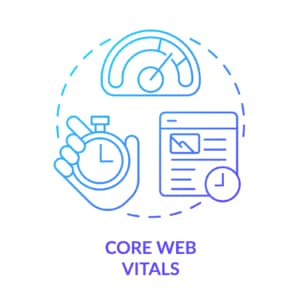As a mental health professional who wants to build their practice’s online visibility, digital marketing may seem like a daunting task. Amidst all of the SEO strategies available, one question arises: Is it worth paying for professional SEO services? Or, should I attempt to tackle SEO on my own?

Let’s delve into the question of whether you should pay someone for your SEO with a clear and practical approach. SEO, or search engine optimization, is the cornerstone of online visibility and success in today’s changing times. While the idea of managing your own SEO may seem appealing, it’s important to consider the expertise, resources, and time required to do so effectively.
What is SEO?
So, what exactly is SEO? Maybe you’ve never heard of it! Or perhaps you’ve worked on your own site’s SEO and just want to learn a little bit more. SEO is optimizing your website and online content to improve its visibility and ranking in search engine results pages (SERPs). Common search engines such as Google, Bing, or Yahoo. In simpler terms, SEO helps your website rank higher on Google when people search for relevant keywords or phrases related to your mental health services. When someone searches for these keywords or services, your website pops up!
At its core, SEO is about understanding what people are searching for online and ensuring that your website provides valuable and relevant information to meet their needs. This involves various techniques and strategies aimed at optimizing different aspects of your website, including:
Keyword Research
Keyword research stands as a strong foundation for SEO. It also involves identifying the specific words and phrases your target audience is using when searching for information related to your therapy services. By understanding the exact keywords your clients use, you can create content that resonates with them and attracts potential clients to your website.
On-Page Optimization
On-page optimization is the optimization of individual web pages to improve their search engine rankings and attract more organic traffic. This involves optimizing meta titles and descriptions and using appropriate headings and tags. In addition to optimizing images, and ensuring that your content is relevant and valuable to your audience.
Off-Page Optimization
Off-page optimization involves activities that take place outside of your website but have an impact on its search engine rankings. This includes building backlinks from reputable websites, establishing your website’s authority and credibility, and engaging with your audience on social media platforms.

Technical SEO
Technical SEO focuses on optimizing the technical aspects of your website to improve its crawlability, indexability, and overall performance in search engines. This includes optimizing site speed, fixing broken links and redirects, improving mobile responsiveness, and ensuring that your website is secure and accessible to both users and search engine crawlers.
Content Strategy and Creation
Content is king in SEO! We help you develop and implement effective content strategies that resonate with your target audience. Whether it’s blog posts, articles, videos, or infographics, we create high-quality, relevant, and engaging content that attracts organic traffic and drives conversions.
Analytics and Reporting
We use analytic tools and platforms to track and analyze website performance, monitor keyword rankings, and measure the effectiveness of our SEO strategies. We provide insights to help you understand your website’s performance and make educated and informed decisions to optimize your SEO efforts.
Local SEO Optimization
For practices targeting specific areas, we offer local SEO optimization services to improve your visibility in local search results. We optimize your Google My Business listing and implement strategies to boost your presence in local directories and maps.
What SEO Services Does Simplified Offer?
At Simplified SEO Consulting, we understand the unique needs and challenges that mental health professionals face when it comes to improving their online visibility and attracting more organic traffic. That’s why we offer a variety of SEO services tailored to meet your specific needs. Here are some of the key SEO services we provide:
Done-For-You (DFY) Monthly Optimization Services
Our DFY monthly optimization services are perfect for busy professionals who prefer to outsource their SEO efforts. With this service, our SEO specialists take care of all aspects of your SEO strategy. This includes keyword research, on-page optimization, off-page optimization, technical SEO audits, content creation, and data tracking. We handle everything from start to finish, allowing you to focus on running your business while we work on driving more organic traffic to your website.
Content Network
Our Content Network service is ideal for practices looking to expand their online presence through strategic content creation and distribution. With this service and for 3 months, we develop a network of high-quality, keyword-optimized content that targets specific topics relevant to your therapy services and clients.
Done-With-You (DWY) Services
Our Done-With-You services are designed for businesses that want to take a more hands-on approach to their SEO efforts. With this service, our team works closely with you to develop and implement an SEO strategy tailored to your specific niches. We provide guidance, support, and expertise every step of the way. Our DWY services empower you to take control of your SEO initiatives while benefiting from our professional guidance and SEO insights.
DIY Online Courses
For therapists whose calendars are full and prefer to learn at their own pace, we offer DIY online courses. These courses cover a wide range of SEO topics and strategies. Our courses are designed to be comprehensive, easy to follow, and accessible to beginners and experienced professionals alike. Whether you’re looking to improve your knowledge of keyword research, on-page optimization, link building, or technical SEO, our courses provide the guidance and resources you need to succeed in the world of SEO.
Building a Strong SEO Foundation

At Simplified SEO Consulting, we are dedicated to helping mental health professionals elevate their online rankings and achieve their goals. Whether you’re a small local therapist or a large group practice, our SEO services are designed to meet your needs. From Done-For-You monthly optimization services to Content Network, Done-With-You (DWY) services, and DIY online courses, we offer a range of options to suit every budget and requirement. So, why wait? Take the first step towards improving your online traffic and driving more ideal clients to your website. Contact us today to learn more about our services and how we can help you achieve your digital marketing goals. Together, let’s elevate your online presence and take your business to new heights in the digital world.
Take the Next Step Toward SEO Success
Ready to elevate your online presence and achieve your digital marketing goals? Don’t wait any longer! Take the next step towards SEO success with Simplified SEO Consulting. Whether you’re looking for hands-on assistance with your SEO strategy, expert guidance to optimize your website, or comprehensive training to master SEO techniques, we have the solutions you need to succeed in the competitive online landscape. Follow the steps below to get started!
- Contact us today to schedule a free consultation.
- Discover how our tailored SEO services can help your business thrive.
- Unlock the full potential of your online presence and drive meaningful results that drive your practice forward.
About the Author
Olivia Ferguson graduated from Central Michigan University with her Bachelor’s degree in Social Work. With a prior history in crime victim advocacy, this brought her great knowledge of the legal justice system and the mental health profession. Connecting those tools together, her goal is to help therapists reach their ideal clients by improving their online presence and rankings with SEO.











